PR queen Roxy Jacenko’s husband Oliver Curtis sentenced to two years in jail
BEFORE Oliver Curtis was led away to begin his jail term he kissed wife Roxy Jacenko and gave her his wedding ring and a $50 note.
AFTER a nailbiting wait, Roxy Jacenko has finally discovered her husband’s fate.
Oliver Curtis has been sentenced to two years’ jail, with a minimum term of one year, in the NSW Supreme Court for conspiracy to commit insider trading.
Justice Lucy McCallum handed down the sentence on June 24, a week after Curtis’ legal team put forward a case for the father-of-two to avoid a prison sentence altogether. He will be eligible for release on a good behaviour bond after 12 months.
Jacenko rushed to embrace her husband before he was taken into custody, leaning over the dock to give Curtis a tight hug and kiss.
She returned for one last hug before Curtis patted down his suit pants and handed his wife his wedding ring and a folded $50 note.
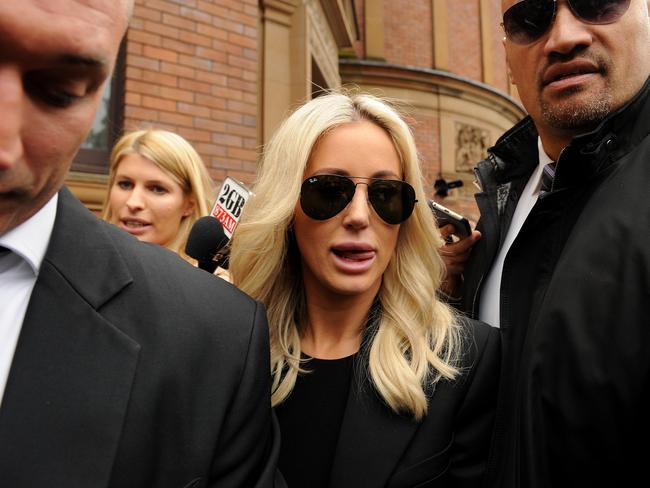
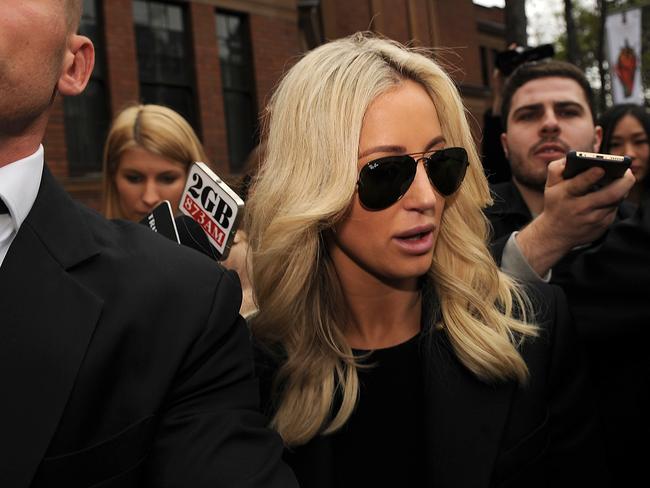
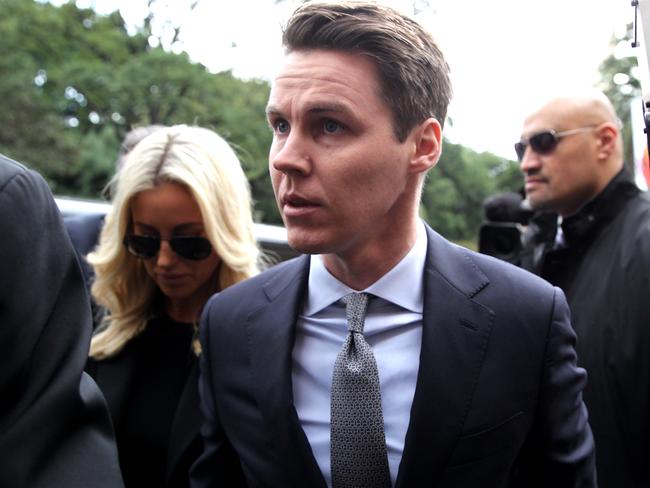
Justice McCallum said that while she accepted Curtis was unlikely to reoffend, a custodial sentence was necessary to deter others from committing white collar crimes, which were notoriously difficult to detect and prosecute.
“I do not think any lesser sentence would be adequate,” she said.
She said insider trading was not a victimless crime as it put the integrity of the financial system at risk, and was typically undertaken by privileged members of society motivated by greed rather than mental illness or addiction.
Curtis’ legal team had sought a suspended sentence or intensive corrections order with home detention.
Justice McCallum said her decision had been influenced by the fact Curtis did not show any remorse until after his conviction, and had offered limited co-operation with law enforcement authorities.
She rejected his barrister’s argument that media interest in the case had been punishment in itself, while noting that, unlike his wife, Curtis had not actively drawn attention to himself.
“There is no evidence that Mr Curtis has courted media attention. He is not to be equated with his wife in this context.”
Justice McCallum declined to give weight to the fact that Curtis would leave behind a young family.
She said while “the prospect of family separation is always gutting”, Jacenko was “well resourced and better placed than many” to endure such a separation.
The court heard Curtis was “a man of incredible resilience” and rejected the argument that jail would damage his rehabilitation prospects, with his “obvious affection for his family” and good career prospects likely to restrain him from reoffending.
She also had no sympathy for what the defence tried to paint as evidence that Curtis had already been punished, through restrictions to his international travel during his three years on bail, or the fact he had been unable to build an “independent” career.
“He has travelled overseas 24 times while on bail,” Justice McCallum said, and noted that Curtis’ father had “looked after him”.
Curtis has enjoyed a high-flying corporate career in various roles in companies connected to his father.
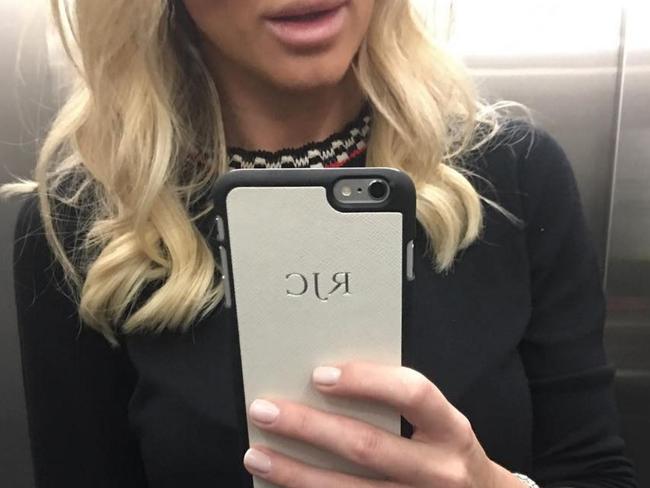
In further sentencing remarks, Justice McCallum said Curtis’ relative youth at the time of the offending — which took place nine years ago when he was 21-years-old — carried limited weight, as the evidence showed he had been a worldly and business-savvy young man, who knew what he was doing was wrong.
The fact that Curtis had not tried to conceal his indentity when setting up the trading account used to execute the 45 trades, was not evidence of a belief that he was acting within the bounds of the law, Justice McCallum said.
Rather, she said, it simply showed that Curtis did not think he would get caught.
She found that Curtis and his co-offender John Hartman were both active participants and that personal gain was “plainly” the motive for their operation, which netted $1.4 million in illegal gains.
“The profits were used to fund a lifestyle of conspicuous extravagance,” she said.
In court, Jacenko sat forward in her hard wooden seat, among the lower level pews reserved for Curtis’ family.
Curtis sat in the dock to the left of the courtroom, hands folded in his lap as he awaited his fate.
He fidgeted, stretched and at one point winked nervously in the direction of his father, businessman Nick Curtis, as the courtroom sheriff organised extra public seating on the ground floor.
He looked anxiously up at the gallery as he waited for the sentence to be delivered.
‘THEY’VE GOT NO REAL EXCUSE’
Australian Securities and Investments Commission Chairman Greg Medcraft welcomed the sentence, while noting that the case would be subject to an appeal.
“This sentence today sends a strong message,” Mr Medcraft told reporters late on Friday morning.
“I am very much for strong deterrence ... If you make the implications very high, then you probably don’t want to take a chance in breaking the law.”
He agreed with Justice McCallum’s comments that people in Curtis’ position should know better.
“They’ve got no real excuse; they are informed,” Mr Medcraft said, adding that he would “actually make [white collar penalties] harsher”, although that was a matter for legislators.
Curtis was sentenced according to the law as it stood at the time of his offending; the maximum penalty has since been doubled from five years’ to ten years’ jail.
Mr Medcraft said that white collar crime must be taken just as seriously as so-called “blue collar crime”.
“I think the community expects that they be treated equally,” he said.
He praised the work of ASIC’s tireless investigators throughout what was a protracted and challenging case.
“I’m sure people know by now that we never give up,” Mr Medcraft said.
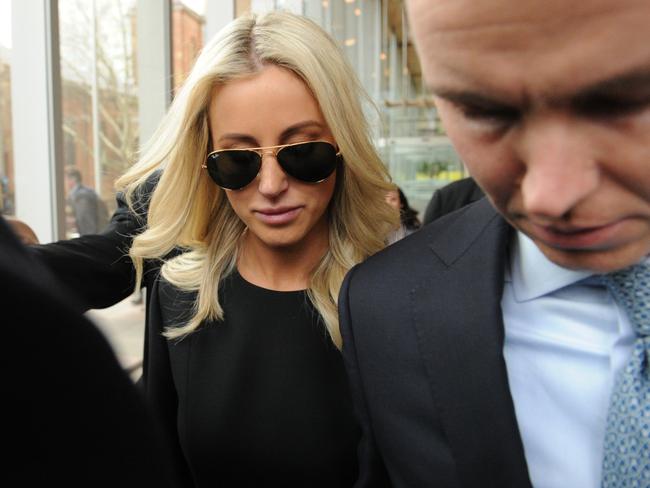
EARLIER
In a character reference filed with the court, Jacenko begged for her husband’s freedom to be preserved, arguing that he was the sole carer for the pair’s children.
Curtis’ barrister Murugan Thangaraj had argued that Curtis should be spared a prison sentence, as he had played a “lesser role” in the insider trading scheme that netted him and former friend John Hartman $1.43 million, and was now a devoted family man.
But the Crown sought a fulltime jail term of at least 18 months, arguing that it was necessary to deter others from engaging in similar schemes.
Mr Thangaraj said at last week’s sentencing hearing that the impact of the court proceedings on Curtis’ personal life and career were drastic enough to deter others from following in his footsteps — and would have remained so even if he had been acquitted.
“There isn’t a person in Sydney who would want to live through what he has,” he said.
He said Curtis had agreed to forfeit the full $1.43 million under proceeds of crime legislation, even though he did not receive the full amount. The exact split of the profits between Curtis and Hartman, initially agreed to be 50/50, has not been established.
The court heard that Curtis and Jacenko’s $8 million Woolhara home had been sold in 2014, with proceeds of the sale restrained by the Commonwealth.
But Justice McCallum challenged Mr Thanaraj: “If your client had been charged with larceny, would we be having this debate? If you stole $1.4 million, would you be putting a submission for a non-custodial sentence?”
Jacenko had put on a brave face during the 12-day trial, posting daily images of her designer courtroom attire to Instagram, including Birkin handbags and thousands of dollars worth of jewellery.
On Thursday, she posted another elevator photograph showing off a new iPhone case, embossed with her initials, prompting an outpouring of support from her followers.
“Sending you much love for tomorrow @roxyjacenko ... you have so many people wishing you well darling xxxx,” one supporter wrote.
Curtis was convicted last month of receiving confidential information about Orion Asset Management through his school friend John Hartman, then a company employee.
The pair took part in deals that earned them up to $20,000 in as little as 10 minutes, using the proceeds to pay $168,420 rent on a luxurious Bondi pad, a $60,000 Mini Cooper, a $20,000 Ducati motorcycle and trips to Whistler and Las Vegas in the US.
Between May 2007 and June 2008, Hartman would send Curtis encrypted BlackBerry messages directing him to buy or sell a particular number of Contracts for Difference (CFDs) on a particular company’s stock at specific times.
On one occasion, Curtis traded more than 30,000 CFDs and earned $11,000, from the information on Orion, which managed $6 billion worth of stock at the time.
Hartman, who was the Crown’s star witness, was himself convicted of insider trading and related offences in 2010, serving a 15-month prison sentence after receiving a 10 per cent discount for agreeing to testify against his mate.
The pair attended the exclusive Saint Ignatius’ College boy’s school at Riverview and both grew up in Mosman on Sydney’s north shore.




